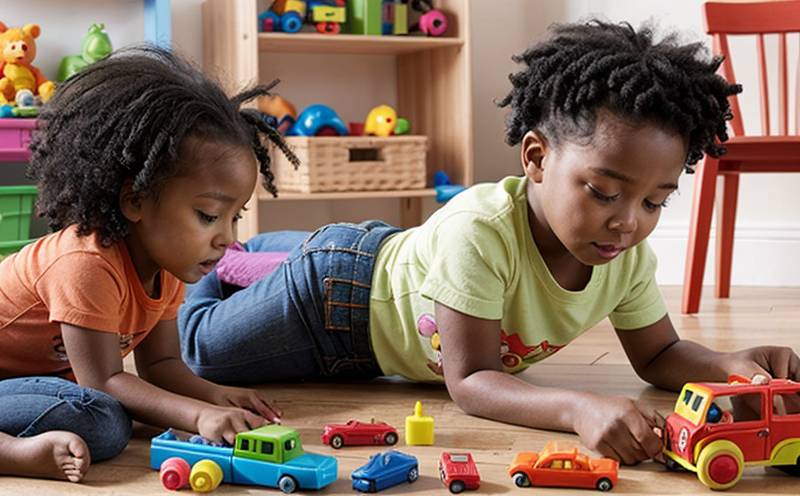UV Resistance Testing in Outdoor Toys
UV resistance testing is a critical component of ensuring that outdoor toys are safe and durable under prolonged exposure to ultraviolet radiation. Ultraviolet (UV) light, which can originate from the sun or artificial sources like lamps, can degrade materials over time, potentially leading to weakening of plastics, fading of colors, and loss of mechanical properties. This degradation may affect the structural integrity and safety of toys, particularly those designed for outdoor use by children.
The importance of UV resistance testing cannot be overstated, especially in a world where toy manufacturers are increasingly targeting outdoor play environments to engage children in fresh air activities. Outdoor toys must withstand harsh weather conditions, including intense sunlight, rain, and humidity. These elements can accelerate the aging process of materials used in their construction. By conducting thorough UV resistance tests, manufacturers can ensure that their products remain safe, functional, and aesthetically pleasing throughout their lifecycle.
UV testing typically involves exposing samples to a controlled environment where they are subjected to artificial light sources that mimic natural sunlight. The exposure time is carefully calibrated based on the expected duration of outdoor usage, ensuring that the test reflects real-world conditions as accurately as possible. Testing parameters include temperature, humidity, and UV intensity levels, all of which can be adjusted according to the specific requirements of the toy in question.
For instance, a children's playhouse designed for long-term outdoor use would require more rigorous testing than a temporary inflatable toy used primarily indoors. The test specimens are usually prepared by cutting out representative sections from the actual toy materials or components. These samples undergo rigorous exposure to UV radiation over extended periods, often ranging from days to weeks.
The testing process not only evaluates material durability but also assesses colorfastness and resistance to cracking, chalking, and other forms of surface deterioration. Manufacturers can use this information to make informed decisions about the type of materials they should employ in their product designs or to modify existing formulations if necessary. By adhering to strict standards, toy manufacturers ensure that their products meet regulatory requirements while also enhancing product longevity.
Regulatory bodies like ASTM, ISO, and EN have established guidelines for UV resistance testing, providing a framework for consistent and reliable results across different laboratories. Compliance with these standards is crucial for ensuring the safety and quality of outdoor toys. Non-compliance can result in recalls, legal action, and damage to brand reputation.
| Standard | Description |
|---|---|
| ASTM F963-17 | Consumer Safety Specification for Toy Standards, including UV resistance testing requirements. |
| ISO 8124 Series | Safety of Toys, covering various aspects of toy safety, including materials durability and UV stability. |
| EN 71-3:2019 | Safety of Toys - Part 3: Flammability, which includes considerations for material resistance to UV light. |
Manufacturers who conduct UV resistance testing should be aware that the test results can vary significantly depending on several factors. These include the type of materials used in construction, environmental conditions during testing, and even the specific equipment utilized. Therefore, it is essential to choose a reputable laboratory like Eurolab, which adheres strictly to these standards and ensures accurate and reproducible results.
Understanding the implications of UV resistance testing for outdoor toys can help manufacturers design safer products that meet both regulatory expectations and consumer demands. By investing in robust quality assurance processes, including thorough UV resistance testing, toy companies can enhance their product offerings while maintaining high ethical standards.
Applied Standards
| Standard | Description |
|---|---|
| ASTM F963-17 | This standard provides comprehensive guidelines for the safety of toys, including requirements for materials durability and UV resistance. |
| ISO 8124 Series | Covers various aspects of toy safety, ensuring that all components meet stringent quality benchmarks, especially in terms of material stability under UV exposure. |
| EN 71-3:2019 | This European standard focuses on the flammability and other fire-related safety issues for toys. It includes provisions that ensure materials used in construction are resistant to UV light, preventing premature degradation. |
Benefits
- Ensures compliance with international safety standards such as ASTM F963-17 and ISO 8124.
- Reduces the risk of product recalls due to material degradation or failure under UV exposure.
- Enhances brand reputation by demonstrating a commitment to quality and safety in toy manufacturing.
- Promotes longer-lasting products, which can lead to cost savings for both manufacturers and consumers.
- Aids in the development of safer materials that are more resistant to environmental factors such as UV light.
Eurolab Advantages
At Eurolab, we pride ourselves on providing comprehensive and accurate testing services for all aspects of toy safety and durability. With a team of experienced professionals specializing in material science, we offer UV resistance testing that is both reliable and cost-effective.
- We use state-of-the-art equipment to ensure precise and consistent results.
- Our laboratories are equipped with the latest technology for conducting thorough environmental stress tests, including UV exposure.
- We provide detailed reports that include all relevant test parameters and findings, helping manufacturers make informed decisions about their product designs.
- Our services are tailored to meet the specific needs of toy manufacturers operating in various markets around the world.





